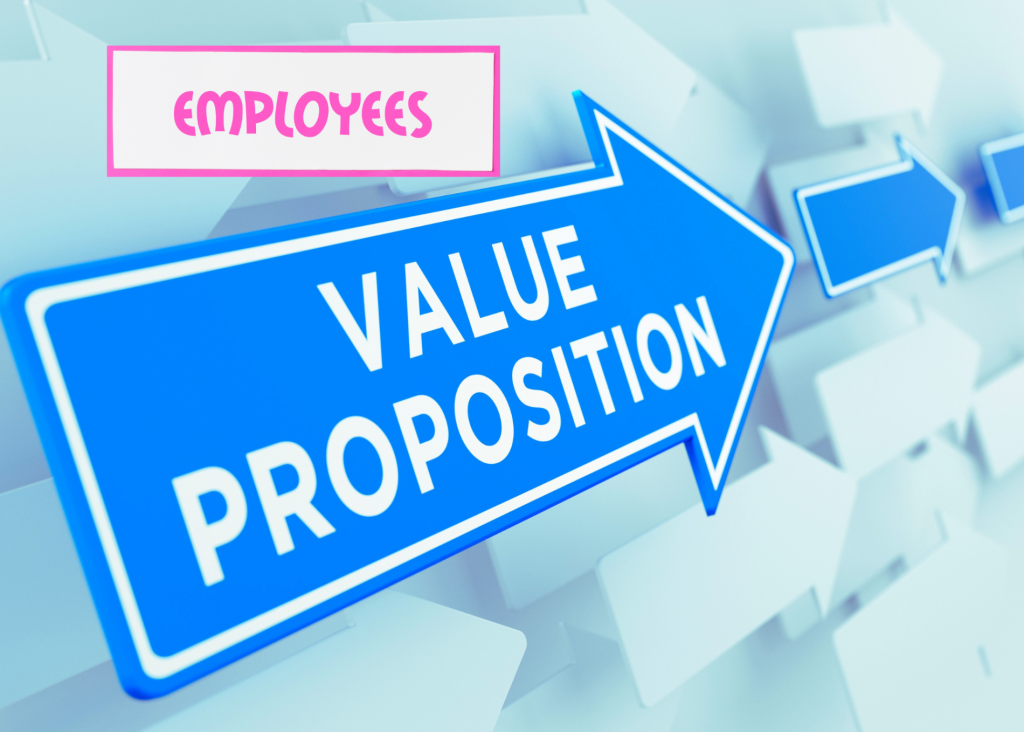Get your EVP on
A job for life. That concept is as extinct as John Howard’s bowling career.
So how do you recruit – and keep – the best people?
The answer lies in your Employee Value Proposition. And as we’ll find out, there’s more to it than discounted gym memberships.
What is an Employee Value Proposition (EVP)?
Let’s face it: your staff don’t come to work as a favour to the executive.
We all need money. But as recruiters, we’ve learned that the exchange between individuals and their place of work is a lot more complicated than that.
An Employee Value Proposition outlines why an employee should choose to work for you. And yes – it does include monetary compensation.
But it also includes intangible benefits that create an ecosystem of support in which staff can achieve their highest potential.
Intangible supports like flexible working policies. Or a pathway for career progression.
In return, your employees bring a diverse mix of knowledge and experience. And if you’ve gotten your EVP right – they’ll bring passion and dedication too.
Why is an Employee Value Proposition important?
A well-thought-out EVP creates a strong employer brand that retains and entices high performers. Why?
Because people generally view the role of work differently today than they did 20 – or even 5 – years ago.
Today, work is integrated more closely into daily life. And so, employees are looking for a broader purpose at work, and values that align closely with their personal ones.
And according to McKinsey, people who live their purpose at work are more productive than people who don’t.
Forward-thinking companies in built environment industries are aware of this. And they’re acting on a growing appetite for work-life balance by re-evaluating their EVP.
For example, we’ve watched a handful of Melbourne construction firms challenge the status quo over the past two years by introducing radical policies that are re-setting employee expectations.
Firms like Kapitol Group, who have implemented a ’10 in 14′ initiative that ensures that no site staff work more than a 10-day fortnight.
These actions put pressure on other businesses in the sector to strengthen their EVP if they want to remain competitive. And who doesn’t need to do that?
What should an EVP include?
According to Gartner, an EVP should address five things under what they call ‘The human deal’:
- Deeper connections — Help employees feel understood. Strengthen their family and community connections – not just work relationships.
What could this look like?
- Integrating inclusion goals in daily work.
- Creating policies that address direct family benefits while matching business needs.
- Radical flexibility — Empower employees to feel autonomous. Provide flexibility on all aspects of work, not just when and where they work.
What could this look like?
- Creating policies that create flexible arrangements in built environment industries – like compressed working works, job sharing opportunities and variable start times.
- Giving staff more power to make decisions within team-established boundaries.
- Personal growth — Ensure that employees feel valued. Help them grow as people, not just as professionals.
What could this look like?
- Career coaching.
- Empowering staff to identify and participate in learning that meets their personal and professional needs.
“What are my opportunities for growth?” is one of the most common questions we get asked by candidates. So this part of your EVP cannot be half-baked.
- Holistic well-being — Reinforce that employees feel cared for. Ensure they actually use holistic well-being offerings – don’t just make them available.
What could this look like?
- Openly addressing mental health at your place of work.
- Establishing guidelines and training for managers on how to support staff wellness.
- Benefits like health insurance, forward-thinking parental leave policies and yes – gym memberships.
This part is also about addressing workplace standards around employee behaviour.
Staff are no longer grateful for a paycheck if it means negotiating Sheila-the-bully in the Commercial team, or avoiding ‘handsy’ Ryan in Estimating. Take a firm stand on harassment in the workplace. It’s a legal – and ethical – requirement.
- Shared purpose — Make sure employees feel invested in the organization. Champion action by the organization on societal and cultural issues.
What could this look like?
- Frameworks for organisation-wide collaboration, to tackle societal issues that align with the company mission statement.
- Paid time off to complete volunteer work.
What about the money bit?
As well as Gartner’s five recommendations, we suggest explicitly addressing financial rewards in your EVP.
Offer a combination of salary, performance-related bonuses, equipment (like cars or phones) or even company shares.
Get creative. Remember, this is about your employees and what they value.
This sounds expensive
Not necessarily.
You don’t have to be a billion-dollar conglomerate to implement – and reap the rewards of – an EVP.
Even small firms can create compelling EVPs that attract top talent. It just means that you need to highlight the unique benefits of working in a smaller firm.
For example, you may not be able to fund a $5,000 personal PD budget. But you can offer staff the chance to work across project functions – allowing them to develop a broader skillset. This is not always possible in a larger company, where staff are hired for discrete roles.
Or you might have experienced workers that can deliver sought-after mentoring and training to those less experienced – creating an affordable proposition in your EVP.
Top talent always wants to grow. So solid mentoring could be a deal-breaker for some staff.
Example EVPs
Let’s explore some of the ways that companies are working towards stellar EVPs.
John Holland Group
John Holland Group’s promise is to offer “benefits as diverse as you are.” They have a range of policies that address holistic well-being and deeper connections, including:
- Two extra days of leave per year to do “whatever you need for your well-being”
- No minimum employment period for permanent employees before being able to take parental leave
- Multicultural Leave Exchange, where staff can swap out public holidays for days that are culturally significant to them
They also have a Flexible Work Framework with a range of options like variable start and finish times to cater for personal needs (flexi-hours).
Mirvac
Mirvac has made a commitment to gender equality, delivering on the deeper connections pillar. Their efforts have paid off – they’ve been named Employer of Choice by the Workplace Gender and Equality Agency (WGEA) multiple times.
And in 2022, Equileap ranked them number one globally in their Gender Equality Global Report – beating 4,000 companies across 19 criteria to take the top spot.
Roberts Co
Roberts Co promise is to “Build a better way.” And that extends to their EVP too.
They’ve made ground-breaking advances in holistic well-being, providing every staff member with mental-health first aid training. And introducing a true five-day work week for site-based staff – called Project 5.
Need some help creating your EVP?
Building Environs offers a recruitment process consulting service where we work with you to improve your overall recruitment process – which includes creating a solid EVP.
Contact Martin Preece online or give him a call at 0400 934 025.




